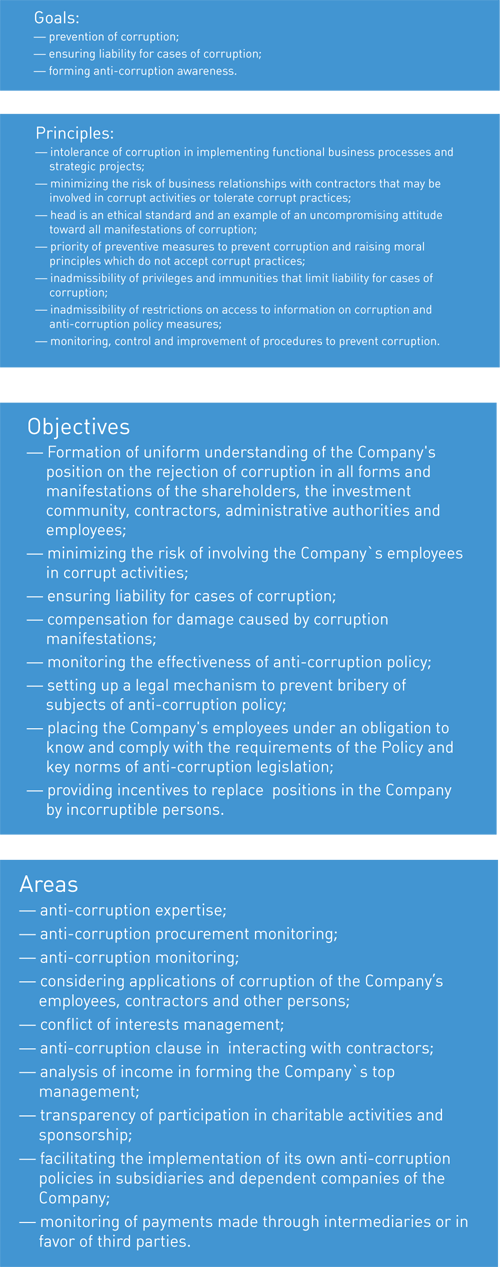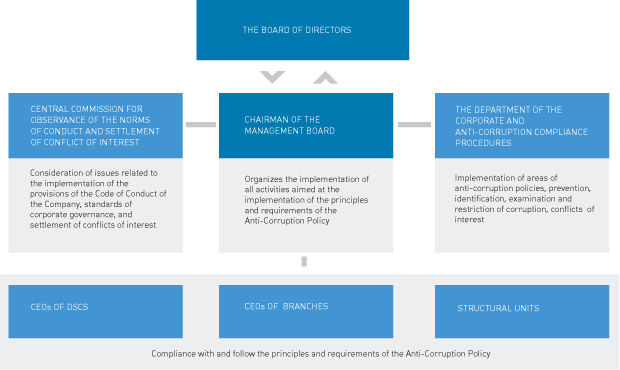- Statement of the Chairman of the Management Board
- Federal Grid Company General Information
- Corporate Governance
- Internal Control System
- The Risk Management System
- Understanding of Corporate Social Responsibility and Sustainable Development
- Human Resources Management
- Managing of the Economic Impact
-
Anti-corruption and Prevention of Conflict of Interests System
- JSC Federal Grid Company`s Anti-Corruption Policy
- Program for Prevention of Corruption and Settlement of Conflict of Interests in Federal Grid Company for 2012-2014
- Implementation of Anti-Corruption Policy and Program for Anti-corruption and Settlement of Conflict of Interests in Federal Grid Company in 2012
- 2013 Plans
- Environmental Impact Management
- Stakeholders Relations
-
APPENDICES
- The UNEG Reliability Provisions
- Innovative Development of the UNEG
- GRI Guidelines Indicators (G 3.1 and the Industry Protocol for Electric Power Industry), Reflected in the Report
- A Report on the Fulfillment of the 2012 CSR Plans and Obligations of JSC FGC UES (Draft)
- A Table of Stakeholders’ Suggestions Pertaining to the Disclosure of Information in the Report, Voiced at the Dialogue on 05.04.2013 and at the Public Hearings on 26.04.2013
- A List of Natural Areas in Preferential Protection (NAPP) Accessible for JSC FGC UES for the Purposes of Operation
- Independent Assurance of Social Reporting
- Glossary and Abbreviations
Federal Grid Company`s Anti-Corruption Policy
Based on the analysis of the global best practices the Company management decided to move the anticorruption priority to the next level in 2012. Therefore the Company started to implement a compliance system, meaning the organizational principles of financial and economic activities that prevent groundless damage and the loss of goodwill occurring due to corruption, the violation of the norms of the Russian laws, or the internal corporate regulations. A Corporate and Anticorruption Procedures Department established within the Executive Body of the Company is responsible for the formation and implementation of the compliance system. In accordance with the international standards, the Department reports directly to the Chairman of the Company’s Management Board.
Apart from the changes in the organizational structure, there also took place a number of changes in the Company’s legal framework in 2012. The first thing to note is the approval by the Board of Directors of the Company’s Anticorruption Policy, which is a fundamental document regulating anticorruption initiatives and defining key tasks, principles and priorities of anticorruption activities.
A precondition required to achieve the goals stated in the Anticorruption Policy consists in the development of a set of the Policy implementation initiatives, meaning a Program to prevent corruption and to regulate the conflict of interests within the Company in 2012-2014. The Program was approved by the Company’s Management Board.
To perform according to the instructions of the President Putin V.V., and the decisions of the Presidential Commission on the Development Strategy of Fuel and Energy Complex and Environmental Issues, to provide for the transparent financial and economic activities and to prevent the conflict of interests, the Company launched an automated process of acquisition and analysis of data on the owners (including end beneficiaries) obtained from the contractors. The Company introduced annual declarations stating data on property, income and property liabilities of the Company top managers.
One more activity pertaining to the exclusion of contractual relationships with unfair contractors consists in the inclusion into the contracts of an anticorruption stipulation, which allows the establishment of business relationships only with partners supporting the Company’s Anticorruption Policy and conducting their business in open and fair manner.
Apart from the priorities of the Anticorruption Policy listed above, in 2012 the Company exercised anticorruption control over the purchasing activities, including the control over the execution of legal documents pertaining to the land used for the UNEG facilities construction. The Company also conducted anticorruption assessment of the industry guideline documents and their drafts, controlled the Company’s participation in charity initiatives and the interaction with government officials. The Company’s subsidiary and dependent companies implemented their own anticorruption policies. The Company checked the applications submitted by the Company employees, contractors and other physical persons and legal entities, informing the Company about instances of corruption. Other initiatives included managing the conflicts of interests, and anticorruption monitoring, etc. In 2012 the Company was focused on corruption prevention, legal education and the formation of loyal behavior of its employees. The initiatives included different topical training sessions, and seminars for the Company employees. The Company employees and those of its branches and dependent companies participated in an anonymous survey intended to identify the personnel’s understanding and attitude to the Company’s Anticorruption Policy.
The Company’s continuous efforts have their results, with 4 546 contractors checked in 2012 (twice as many, compared to 2011). The number of industry guideline documents checked for corruption potential grew twice, with the number of documents checked during anticorruption monitoring of purchasing activities growing thrice (compared to 2011), while the economic effect amounted to RUR 116 million.
Throughout the formation period of the Company’s Anticorruption Policy we had to deal with a number of difficult tasks and despite the success of the Company’s actions, we are going to proceed with improvement and development of our anticorruption priority, conducting anticorruption initiatives on a systematic basis. We plan to actively revise the Company’s internal legal framework pertaining to the implementation of corporate and anticorruption compliance procedures, and to implement new preventive measures within the existing business processes.
The formation of JSC Federal Grid Company`s Anti-Corruption Policy began in 2010 by adopting JSC Federal Grid Company`s Program for Anti-corruption and Settlement of Conflicts of Interest for 2010-2011 and the Plan of main activities on implementing Program for 2010 - 2011. In 2010-2011 Federal Grid Company was improving legal regime of anti-corruption activities.
During this period, the Company:- — developed a number of organizational and administrative documents in the field of anti-corruption;
- — set up anti-corruption examination of documents, anti-corruption control over procurement activities, and anti-corruption monitoring system;
- — formed a Commission to observe the rules of corporate conduct and settlement of conflict of interests;
- — set up an interactive channel to communicate with the Company`s contractors - legal entities and individuals - via a "hot line" (Internet site, "helpline");
- — began corruption prevention work, legal education and developing the foundations of law-abiding behavior of the Company`s employees.
The activities resulted in the approval* of JSC Federal Grid Company`s Anti-Corruption Policy in 2012, the basic document setting out the main objectives, principles and areas of anti-corruption activities of the Company.
* The Anti-Corruption Policy was approved by the Company’s Board of Directors (Minutes No 171 dated 24.08.2012, put into effect by the Company’s Order No 545 dated 12.09.2012)Goals, objectives, principles and areas of Federal Grid Company`s Anti-Corruption Policy

The Company`s Anti-corruption Activities Management Structure
Effective management of the Company`s anti-corruption activities is achieved by the interaction of the following participants:
-
The Board of Directors:
— approves the Anti-Corruption Policy, including amendments and additions;
— identifies key areas of Anti-Corruption Policy;
— controls the overall results of the implementation and application of the Anti-Corruption Policy.
-
Chairman of the Management Board:
— is responsible for the organization of anti-corruption activities, including appointment of responsible persons;
— monitors the implementation of Anti-Corruption Policy and submits a report to the consideration of the Board of Directors;
-
The Department for corporate and
anti-corruption compliance
procedures:
— carries out activities aimed at the implementation of the Anti-Corruption Policy;
— carries out activities to prevent, identify, examine and curb cases of corruption, conflict of interests;
— coordinates activities of structural units of the executive apparatus, branches, DSCs of the Company in the field of implementation of the Company`s Anti-Corruption Policy.
Commission for observance of the rules of conduct and settlement of conflict of interests is a collegiate authority which examines cases of non-compliance standards of corporate ethics and corporate conduct requiring resolution of conflict of interests, including cases of discovery of corruption.
CEOs of branches and DSCs of the Company, as well as specially created structural units of DSCs of the Company are responsible for implementing the provisions of the Company`s Anti-Corruption Policy in branches and DSCs. The Company`s structural units and employees directly observe the principles and fulfill the requirements of the Company`s Anti-Corruption Policy in their current performance.


 square km
square km